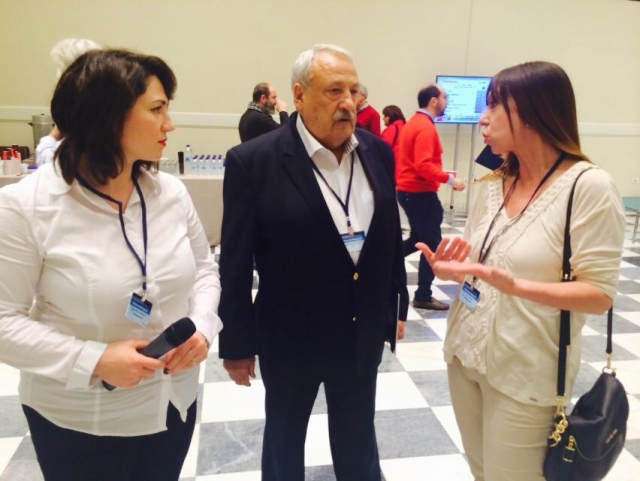Anastasia Balezdrova
The convincing victory of the radical left SYRIZA party in the early parliamentary elections is not surprising to anyone. What is not yet clear is whether the party will be able to form a separate office and what its tactics in terms of Greece’s lenders will be.
According to renowned Bulgarian journalist and expert on Greece Ivan Garelov, the campaign took place in a totally different way compared to previous pre-election campaigns, indicating a change in the behaviour of Greek voters.
In an interview for GRReporter he said that SYRIZA’s victory is one of the most significant moments for Greece and defined its leader Alexis Tsipras as a brilliant and charismatic politician.
Mr. Garelov, how would you explain SYRIZA’s so categorical election victory?
It has really gone beyond even the preliminary estimates. I would explain it with the presence of a very powerful turn to this party. A large number of people who are hesitant have followed it but that does not mean that these attitudes are firm.
Overall, I see mobility between the traditional parties. The old hard party cores no longer exist. Whether this is opening bright horizons for SYRIZA is yet to be seen because the result was expected. The unknown will start tomorrow. Hard times are in store for the winners.
How do you assess Alexis Tsipras’ leadership qualities?
As a politician, he is brilliant, charismatic. This is indisputable. I think a great part of the success of the party is due to his personal qualities. He is not only charming, but also very clever.
I noticed that over the past few weeks he avoided talking about extreme actions, which could turn off some undecided voters.
Of course, his practical experience as a statesman is zero. All this is yet to become clear. I am worried about the upcoming two months for Greece, as if the government of SYRIZA is independent, it will start very tough negotiations with the lenders. The behaviour of the rest of the parties will be very important. I think they should support the government, regardless of what it is, in these negotiations in order to be able to achieve better conditions for Greece and they could quarrel, allocate seats, etc. afterwards.

You said that these elections remind you of the elections in 1974. What are the similarities?
They are the great interest, the fact that all expected something new, because after seven years of military junta they were the first free democratic elections.
Incidentally, the expectations at that time were for a stronger representation of the left wing. But we saw that the moderate right in the face of Konstantinos Karamanlis won the elections. Perhaps the slogan "Karamanlis or tanks" influenced the vote at that time. People were afraid that if they voted for the Communists, it could mean a new civil war. Therefore, they preferred a reasonable approach. However, we cannot deny that Karamanlis legalized the Communist Party at the same time too.
I remember that, on the election night, I was with Alekos Panagoulis who is a national hero in Greece, together with Oriana Fallaci, a famous Italian journalist and his friend. Panagoulis had just entered Parliament and Fallaci told me a remarkable phrase, "When a dictatorship falls from power, it is not those who have struggled against it who the most necessarily come to it."
You have spent a week in Athens. What are your impressions of the election campaign?
Regardless of their critical nature, I believe that the elections and the election campaign in general were very quiet. With these temperamental and pathetic people such as the Greeks, this time no cars honked, not all parties held meetings in the open and the meetings that took place were much smaller, with a lower tone. This means that people think more than succumbing to their passions, and I am very pleasantly surprised. This is a European behaviour.
It was very exciting for me to meet and film in detail a famous Bulgarian here, trade unionist Kostadinka Kuneva, who is now a MEP.
You have been covering Greek reality for years. What is the most exciting event that you have witnessed?
There are three. The elections in 1974 remain the most important event for me because the military junta fell and all Greeks wanted freedom.
PASOK coming to power in 1981 also marked a change. Andreas Papandreou came out with very leftist slogans. I think that everyone who wants to win the elections in Greece should use leftist slogans. Of course, a small part of what he promised was fulfilled because it related to Greece's foreign policy. But in all cases, it was a change, because the right wing for the first time gave way to another bourgeois party, which was more left oriented.
The third event is today's elections. Apparently, it was hard for the Greek people to go through the austerities, which is why they have taken such a bold decision. I hope that it is in their favour.